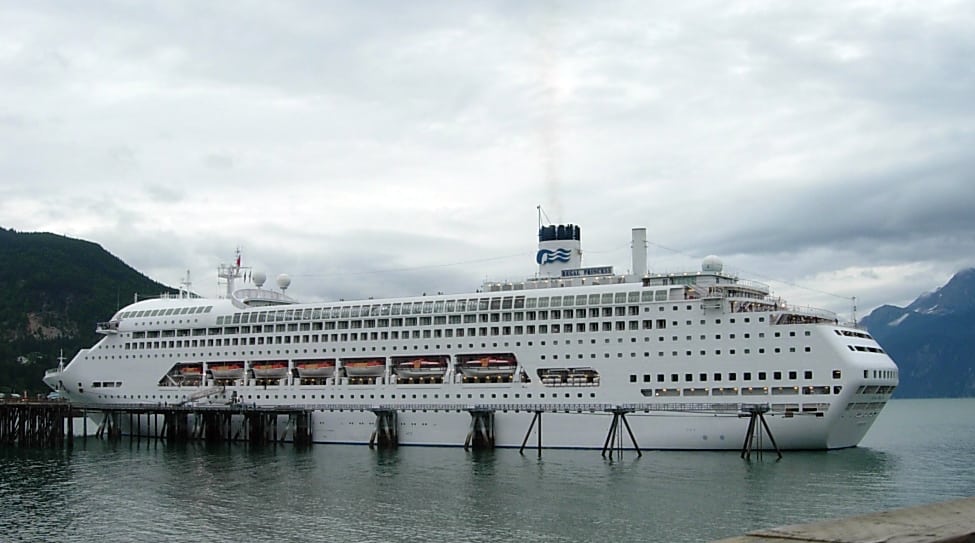Skift Take
Certain less-forward-thinking members of the Alaskan state legislature are happy to turn over the state's environmental policies to cruise lines. But all Alaska has going for it is nature, and nature needs to smell nice.
The Alaska House on Monday passed legislation that critics say would roll back requirements that cruise ships meet state water quality standards when dumping wastewater.
The 27-9 vote followed unsuccessful efforts, led by minority Democrats, to amend HB80, including requiring the location, date and volume of discharged wastewater be posted online.
Rep. Craig Johnson, R-Anchorage, served notice of reconsideration, meaning the bill could be voted on again before being sent to the Senate. A spokesman for the House Democrats said Johnson agreed to do this on behalf of Minority Leader Beth Kerttula, who had an excused absence.
Rep. Paul Seaton, R-Homer, was the only Republican who voted against the bill.
HB80, from Gov. Sean Parnell, would change how the state regulates wastewater from cruise ships.
Parnell’s Environmental Conservation commissioner, Larry Hartig, has said the measure would align rules for cruise ships with those for others that get discharge permits from the agency. Critics say it would reduce protections set out in a 2006 citizen initiative that required cruise ships to meet state water quality standards when dumping wastewater.
The bill would require that cruise ships discharge wastewater in a manner consistent with applicable state or federal law. It would strike the more stringent requirement that discharges meet state water quality standards at the point of discharge. It also would allow authorization of mixing zones if ships meet certain standards for treatment of discharge.
Hartig testified that his department can set restrictions for mixing zones, a point reinforced by supporters Monday. Michelle Bonnet Hale, director of the department’s Division of Water, has said the department doesn’t currently plan to monitor at the edge of mixing zones but has the authority and funding to do so.
HB80 stems from a preliminary report by a science advisory panel charged with looking at pollution from cruise ships. The panel found none of the advanced systems on ships operating in Alaska waters could consistently meet water quality standards at the point of discharge for “constituents of concern,” ammonia, copper, nickel and zinc.
It also identified “little additional environmental benefit” to be gained by lowering the current permitted effluent limits to water quality standards at the point of discharge. It said a dilution model, developed by an earlier panel, and other studies show concentrations lower than the water quality standards within seconds following discharge of the treated wastewater.
Supporters of Parnell’s plan, including the Alaska Cruise Association, have touted these findings as proof a change is needed.
One of the panelists, marine ecologist Michelle Ridgway, testified against the bill, saying she disagreed with several of the findings, including that fish and marine mammals would be protected under a general permit.
Ridgway said an environmental benefit would be derived and the dilution model and studies were done under “very specific and narrow” assumptions and didn’t adequately consider features of coastal Alaska’s oceanographic conditions. She said she thought the report would undergo further review before being finalized.
Rep. Andy Josephson, D-Anchorage, called the measure a “retreat” from voters’ wishes.
Rep. Les Gara, D-Anchorage, said voters wanted a bill “that protected the world’s greatest fisheries from pollution, from sewage, from copper ….”
He said if this change is made, there will be less pressure on the cruise industry toward new technologies to protect Alaska’s fisheries.
Rep. Charisse Millett, R-Anchorage, said it is hypocritical of the state to hold the cruise ship industry to a higher standard than it requires for Alaska’s ferry system.
Rep. Chris Tuck, D-Anchorage, said maybe the ferry system should be looked at, but he said it pales in size to the “floating cities” that are cruise ships.
Johnson said the report was based on science and expressed frustration that the issue had become politicized.
“Mr. Speaker, either we base it on science, or we don’t,” he said.
Copyright (2013) Associated Press. All rights reserved. This material may not be published, broadcast, rewritten, or redistributed. ![]()
The Daily Newsletter
Our daily coverage of the global travel industry. Written by editors and analysts from across Skift’s brands.
Have a confidential tip for Skift? Get in touch
Tags: alaska
Photo credit: The Regal Princess in Haines, Alaska. Tony Hisgett / Flickr
